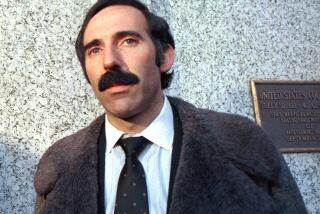Takeover Artist Bilzerian Called ‘Phony’ at Trial
- Share via
NEW YORK — Takeover artist Paul A. Bilzerian was a “phony” who deceived investors, corporate targets and the government to make millions in hostile raids, a federal prosecutor charged Tuesday at the opening of Bilzerian’s securities fraud trial.
Bilzerian, who is chairman of Singer Co., borrowed other people’s money to make himself appear formidable to corporate targets, Assistant U.S. Atty. David Brodsky said in his opening statement. On top of that deception, Bilzerian hid his ownership of stock under the name of former securities executive Boyd L. Jefferies to strengthen his hand in raids, Brodsky charged.
“In the past, the lies brought him lots of money,” the prosecutor said. “Today, they bring him to the bar of justice.”
The case is the latest to go to trial from the family of Wall Street corruption cases that grew from the leads provided by imprisoned stock speculator Ivan F. Boesky. As with the trial of GAF Corp. and one of its executives, it will rely heavily on the testimony of Jefferies, the founder and longtime head of the Los Angeles-based Jefferies & Co. securities firm.
Bilzerian is charged with 11 counts of violating securities and tax laws by failing to disclose his stock holdings. The case centers on failed corporate raids against four companies: apparel maker Cluett-Peabody & Co., the H. H. Robertson construction concern, steelmaker Armco and Hammermill Paper Co.
Bilzerian has asserted his innocence since he was indicted in December. One charge against him has been dropped.
Brodsky said that in 1985 Bilzerian didn’t have nearly enough money to make the public think he should be taken seriously as a corporate raider. So he “concocted a formula for instant credibility” by borrowing large sums from investors, including shopping center magnate Edward DeBartolo, according to the prosecutor. Bilzerian made it appear that the money was his own, Brodsky said.
Bilzerian promised that he would split his profits evenly with investors and that they would be shielded from any loss, Brodsky said.
Brodsky described Bilzerian as “a man of relatively modest wealth willing to put other people’s wealth on the line--in a word, a phony.”
The prosecutor said Bilzerian deceived the Securities and Exchange Commission and the Internal Revenue Service about the source of his wealth and his ownership of stock. He used several means for hiding its ownership, Brodsky added.
But Arthur Mathews, a Washington lawyer for Bilzerian, said the case should not have been brought and had come to trial only to justify the plea agreement prosecutors had reached with Jefferies. “The government strains to justify the bad bargain they made,” he said.
Mathews, apparently referring to Bilzerian, said Jefferies could not turn in anyone above him but had “implicated a few scapegoats.” But Mathews insisted that “there has been no one hurt--no one has been deprived of any money or property.”
The government is expected to call about 20 witnesses in the trial, the first of whom is due to testify today. Prosecutors declined Tuesday to disclose the identity of that first witness.
The trial will be another important test of the credibility of Jefferies, who was strongly challenged by defense attorneys in the GAF Corp. stock manipulation trial. That case ended once in a mistrial and a second time with a deadlocked jury.
More to Read
The biggest entertainment stories
Get our big stories about Hollywood, film, television, music, arts, culture and more right in your inbox as soon as they publish.
You may occasionally receive promotional content from the Los Angeles Times.











